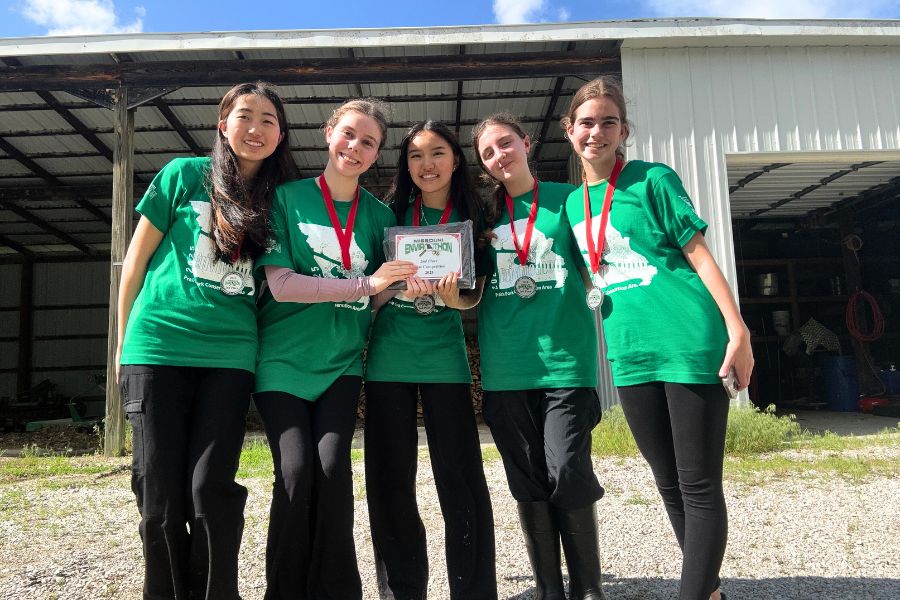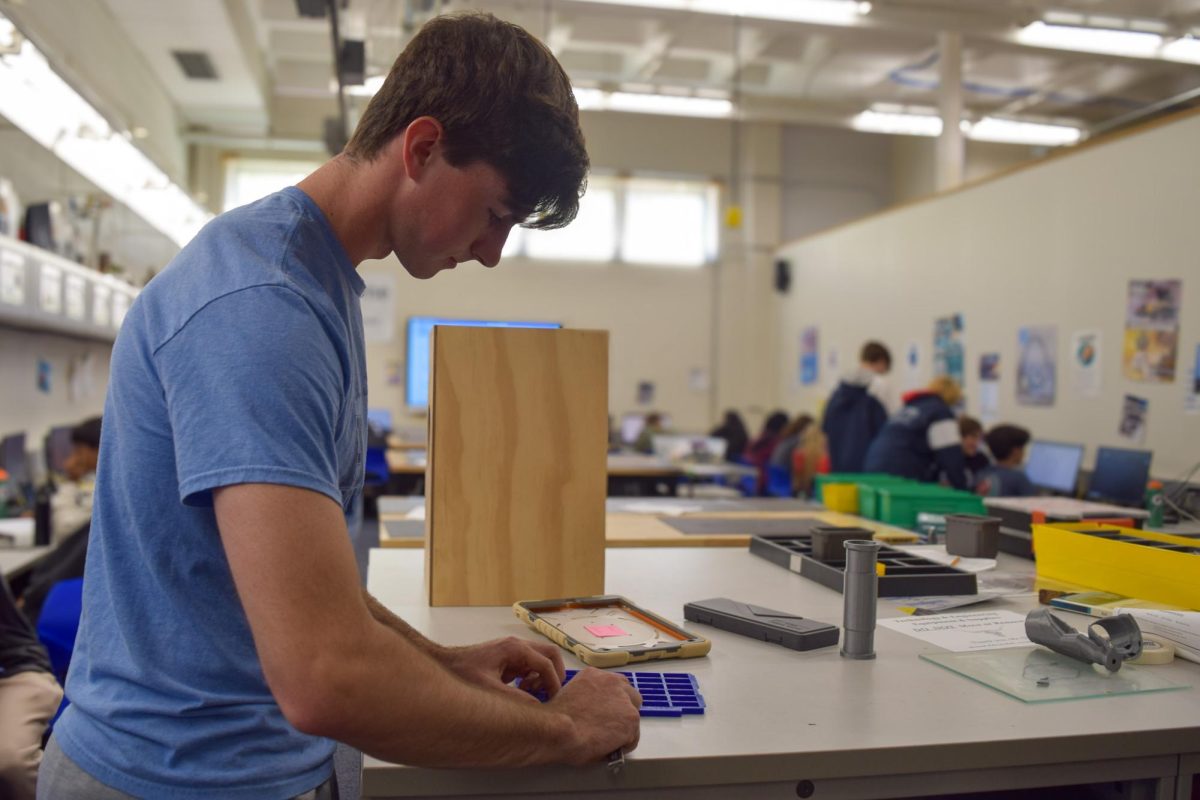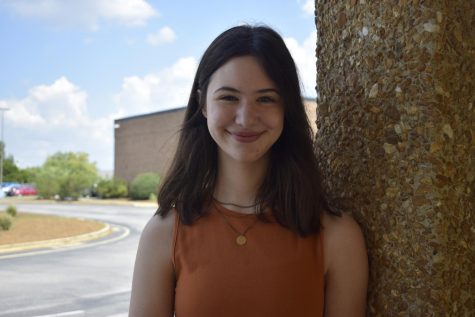Cramped at the Cairo outlet mall, almost unable to breathe in the stuffy air and trying to find her friends over the crowd of people, freshman Alia Hammad recalls life as she knew it before coming to America. The bustling streets of Cairo, Egypt were home to Hammad until her family arrived in the suburbs of St. Louis for her father’s job when Alia was in eighth grade.
“I was very excited to try something new, but when everything started getting absolutely real, like going to school [and] being in our [new] home, we were like ‘whoa, what is happening right now,’” Hammad said.
After attending the same school in Egypt for her whole life, Hammad started her first day of school in America in early October.
“I was not even concentrating on who was talking to me. I can’t even tell you who was the first person I talked to or who were the people I met first because I was just concentrating on where my classes were,” Hammad said.
In Egypt, Hammad attended a private school and found it to be more challenging.
“There are some [subjects] that we’re taking, like algebra, I took in grade 6. I don’t think that was a good thing, it was more stressful for me. Some lessons were hard for me to learn at a young age. It’s much better for me here. It’s a stereotype that school is very hard here, but I figured out it’s way easier here than I thought.” Hammad said.
When Hammad came to America, she realized she had limited experience with some subjects taught here.
“I think that the hardest subject is history. It’s kind of related to the things we took [last] year, [but] my first U.S. history [class] was last year. [In Egypt] we used to [learn] some American history but concentrated more on Egypt’s. When I came here I had a shock, like, ‘oh my god, I have no idea what they’re talking about.’ Both my teachers that I have this year and last year helped me through the whole thing, which made it easier for me,” Hammad said.
Prior to going to school in the U.S., Hammad was nervous because of what she saw in the movies.
“I found that people here are friendly. Before I came, I thought “I’ll get bullied like I see in the movies.’ There’s [always] that new girl in school, she always gets bullied in all these teen movies in high school or late middle school. I saw myself in these people and [thought] ‘what will I do when [I’m in] their place?’ [I was] pretty sure that [was] going to happen to me, [but] when I came here, since the [moment] I entered in school, everyone was super friendly.” Hammad said.
Hammad found it difficult to adjust to the nightlife in St. Louis. In Cairo, businesses close around 1 a.m., while here they close around 9 p.m.
“It was [shocking] that people here are active in the morning. Egypt has a huge, amazing nightlife that’s not here. The first night [my family and I] came, everything was so dark and quiet, with so [many] trees. I’m trying to improve my sleeping habits, but it’s hard,” Hammad said.
Now, Hammad spends her time doing more simple activities here in St. Louis, a city eight hours behind her hometown of Cairo.
“It was hard to adjust, I’ve had the same lifestyle my whole life. I try to fill the nighttime with cooking new recipes or watching movies, but it’s pretty different. When an event happens [in Egypt] it’s exciting and I want to be there and join [my friends]. It’s not always easy to communicate with them. It doesn’t feel good, but I understand it’s not our choice. They tell me what happened later on, we always figure it out.” Hammad said.
Hammad has encountered many false assumptions and stereotypes about Egypt.
“A lot of people think Egypt is a very old country that doesn’t have new things. Most people think that we go to school by a camel and that’s not true,” Hammad said. “I’ve never ridden a camel before. A lot of people think that Egypt doesn’t really have that much good stuff. That’s not true. Some people feel sad that people think of their country [as these stereotypes], but I don’t feel like that because I show them videos about Egypt and show them that it’s new and up to date.” Hammad said.
The place in Egypt that Hammad misses most is the North Shore. Hammad and her family spent many summers there.
“We have a house there and [all] of our family [has] a house so we’re like a huge family there. I miss the family gatherings, we’d stay at the beach till 8 or 9 p.m. I miss the North Shore, even when I’m in [Cairo].” Hammad said.
Hammad’s trip to her home country got delayed in March due to COVID-19. However, she and her family returned for a visit this past August, which included a trip back to the North Shore.
“[I remember] just waking up in the morning, opening up the windows, and then planning what to wear for the day. Then walking to the beach and going to each of my friend’s houses [and] gathering with each other,” Hammad said. “We suddenly found ourselves with 20 people. We [didn’t] even know who these people [were]. [I] got to know these people. I got extremely close with them. I felt super sad going back to Cairo after the North Shore because these people became an important part of my day after [seeing] them for a whole month.”
Because of her permanent move to America, Hammad has learned to be happy wherever she calls home.
“[On my trip back to Egypt] I didn’t really feel sad that I’m leaving the United States but happy that I’m going back to Egypt. It’s a mixed feeling. At this point, it’s okay for me to stay [both places], to stay in America [or] Egypt. Egypt is still my home because I still spend a lot of time there and because all my memories [that were] made there, but I feel like America is my second home,” Hammad said.
After her move, Hammad believes her relationships and support system were only strengthened.
“My family is supporting me, we’re all supporting each other,” Hammad said. “Whenever I’m [missing Egypt] they [explain] how everything will pass and that we will get to visit again. We’ve always been very close, but [now] we see each other even more. Our bond has gotten stronger and stronger.”


![On a trip to Hurghada, Egypt, freshman Alia Hammad and her cousin Omar parachute over the Red Sea. This adventure took place in July 2019, about four months before her big move. "I loved it. I saw the purple jellyfish and coral [because] the water was so clear.” Hammad said.](https://pwestpathfinder.com/wp-content/uploads/2021/02/0d50a0dd-8e38-4519-9487-177a89958a4e-900x601.jpeg)

![Gazing across the stage, sophomore Alexis Monteleone performs in the school theater. The Monteleone family’s band “Monte and the Machine” has been releasing music since 2012, but Alexis started her own solo career in 2024 with the release of her first single, Crying Skies. “My whole family is very musical, [and I especially] love writing [songs with them],” Monteleone said.](https://pwestpathfinder.com/wp-content/uploads/2025/09/DSC7463-1200x798.jpg)
![Amid teaching a lesson to her AP Calculus BC class, Kristin Judd jokes alongside her students in their funny remarks. Judd has always enjoyed keeping the mood light in her classroom, along with on the volleyball court. “[I enjoy] that side talk where you see [or] overhear a conversation and chime in, or somebody says something funny,” Judd said.](https://pwestpathfinder.com/wp-content/uploads/2025/09/image-1200x730.jpg)
![Eyeing the ball, junior Ella McNeal poses for her commitment pictures at Clemson University. McNeal’s commitment comes after months of contact with top Division 1 soccer programs. “ It has taken a lot to get to where I am, but I know that [what] I've already been through is just the beginning, and I can't wait for what is to come,” McNeal said.](https://pwestpathfinder.com/wp-content/uploads/2025/09/IMG_4926-1200x900.jpeg)


![Senior Adam Zerega stands with senior Dexter Brooks by farm equipment. Zerega often worked with friends and family on his farm. “I've been able to go to my family's farm since I was born. I [spend] at least three weekends a month [on the farm], so I'm there all the time,” Zerega said.](https://pwestpathfinder.com/wp-content/uploads/2025/04/IMG_4872-1200x900.jpg)

![Phage grown by senior Rio Naghibi Harat sit in petri dishes. Through Webster University, Naghibi Harat was given the opportunity to develop phage as a potential remedy for tuberculosis. “Phage are everywhere. I got mine from a soil sample. I'm not kidding; I picked [it] up from dirt. They're harmless, unless you code them to do something, and they can evolve. Virus antibiotics can't. They're one solid molecule. A strain of this bacteria [can evolve] that is resistant to [a] particular drug, [but] phage will evolve with the bacteria. They can see the changes, and they can be the change,” Naghibi Harat said.](https://pwestpathfinder.com/wp-content/uploads/2025/04/Flag-2.png)
![Hosting a meeting for Women’s History Month, co-president Bethany Liao converses with club members of Women in Healthcare. The event fostered discussions about women in medicine and included a third year medical student from Bosnia as a guest speaker. “Creating this club has been a net positive experience for everyone. After we present [or a guest speaker], we [also] usually have snacks for everyone and it gives people an opportunity to generally talk or discuss,” Liao said.](https://pwestpathfinder.com/wp-content/uploads/2025/04/DSC0032-1-1200x800.jpg)
![Leaning on the podium, superintendent Melissa Schneider speaks to Parkway journalism students during a press conference. Schneider joined Parkway in July after working in the Thompson School District in Colorado. “My plan [to bond with students] is to get things on my calendar as much as possible. For example, being in [classes] is very special to me. I am trying to be opportunistic [meeting] kids [and] being in [the school] buildings. I have all the sports schedules and the fine arts schedules on my calendar, so that when I'm available, I can get to them,” Schneider said.](https://pwestpathfinder.com/wp-content/uploads/2025/09/IMG_5425-1200x943.jpeg)

![Leaping through the air, senior Tyler Watts celebrates his first goal of the season, which put the Longhorns up 1-0 against the Lafayette Lancers. Watts decided to play soccer for West for his last year of high school and secured a spot on the varsity roster. “[Playing soccer for West] is something I had always dreamed of, but hadn’t really had a good opportunity to do until now. It’s [really] fun being out [on the field], and I’m glad I decided to join the team. It’s just all about having fun with the boys and enjoying what time we have left together,” Watts said.](https://pwestpathfinder.com/wp-content/uploads/2025/09/DSC_1951-1200x855.jpg)

![Junior Fiona Dye lifts weights in Strength and Conditioning. Now that the Trump administration has instituted policies such as AI deregulation, tariffs and university funding freezes, women may have to work twice as hard to get half as far. "[Trump] wants America to be more divided; he wants to inspire hatred in people,” feminist club member and junior Clara Lazarini said.](https://pwestpathfinder.com/wp-content/uploads/2025/05/Flag.png)
![As the Trump administration cracks down on immigration, it scapegoats many immigrants for the United States’ plights, precipitating a possible genocide. Sophomore Annabella Whiteley moved from the United Kingdom when she was eight. “It’s pretty scary because I’m on a visa. When my visa expires next year, I’m not sure what’s going to happen, especially with [immigration] policies up in the air, so it is a concern for my family,” Whiteley said.](https://pwestpathfinder.com/wp-content/uploads/2025/05/DSC_0077-7copy.jpg)
![Shifting global trade, President Donald Trump’s tariffs are raising concerns about economic stability for the U.S. and other countries alike. “[The tariffs are] going to pose a distinct challenge to the U.S. economy and a challenge to the global economy on the whole because it's going to greatly upset who trades with who and where resources and products are going to come from,” social studies teacher Melvin Trotier said.](https://pwestpathfinder.com/wp-content/uploads/2025/05/MDB_3456-1200x800.jpg)

![Pitching the ball on Apr. 14, senior Henry Wild and his team play against Belleville East. Wild was named scholar athlete of the year by St. Louis Post-Dispatch after maintaining a high cumulative GPA and staying involved with athletics for all of high school. “It’s an amazing honor. I feel very blessed to have the opportunity to represent my school [and] what [it] stands for,” Wild said.](https://pwestpathfinder.com/wp-content/uploads/2025/05/unnamed-6-1200x714.jpg)
![Red, white and blue, the American flag holds the values of our democracy. The fight that we once endured has returned, as student journalists and senior correspondents across the country are losing their voices due to government control. “[Are] the White House and [the] government limiting free speech [and] freedom of the press? Yes [they are],” chief communications officer of the Parkway School District and former journalist Elisa Tomich said.](https://pwestpathfinder.com/wp-content/uploads/2025/03/Untitled-design-14.jpg)
